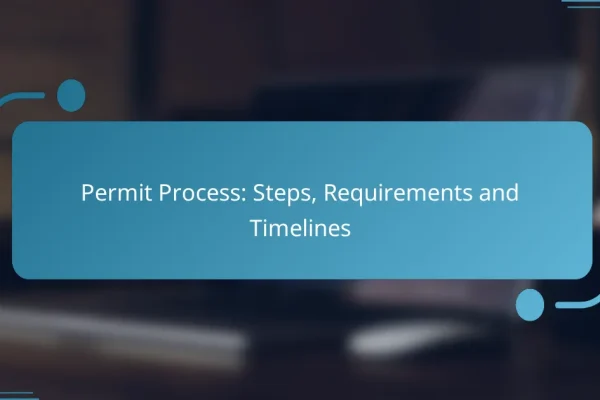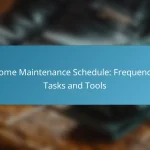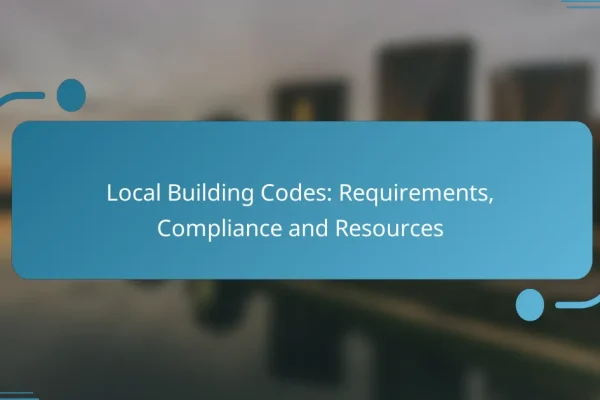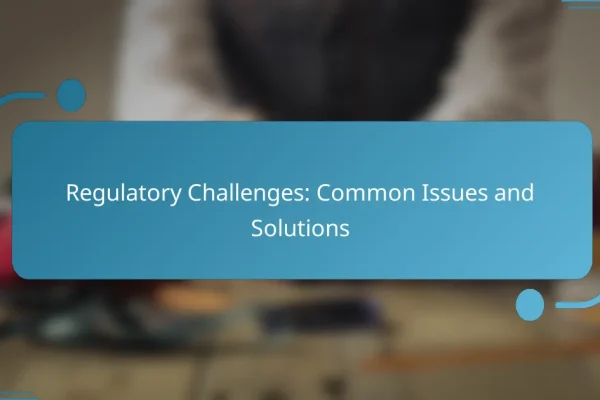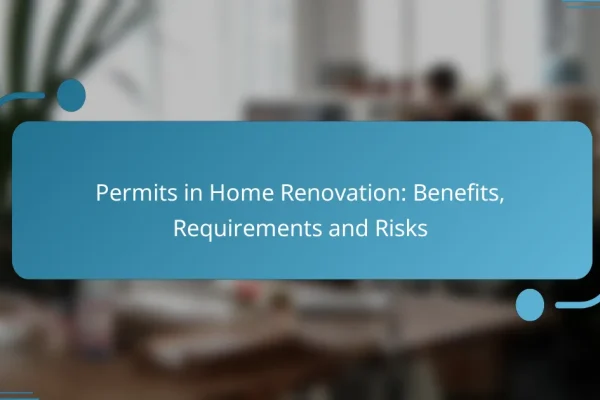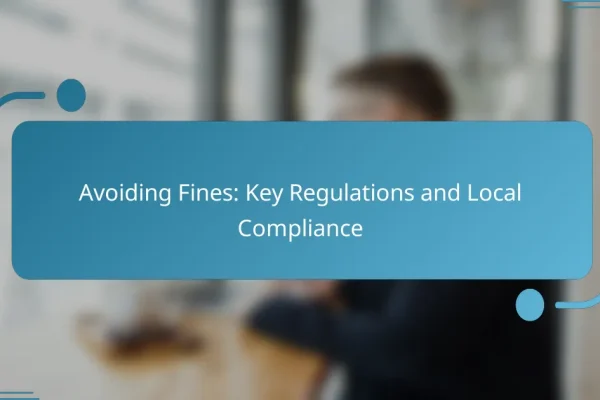What permits are required for home renovation in California?
In California, various permits are necessary for home renovation projects to ensure compliance with local building codes and safety regulations. The specific permits required depend on the scope of the renovation, including structural changes, electrical work, plumbing modifications, and more.
Building permit
A building permit is essential for most home renovation projects that involve structural changes, such as adding or removing walls, or altering the layout of a home. This permit ensures that the work meets safety standards and complies with local zoning laws.
To obtain a building permit, homeowners typically need to submit detailed plans and specifications of the proposed work to their local building department. Fees for building permits can vary widely, often ranging from a few hundred to several thousand dollars depending on the project’s complexity.
Electrical permit
An electrical permit is required for any renovation that involves new electrical installations, upgrades, or significant alterations to existing wiring. This permit ensures that all electrical work adheres to the National Electrical Code and local regulations.
Homeowners should hire a licensed electrician to perform the work and pull the necessary permit. Failing to obtain an electrical permit can lead to safety hazards and potential fines from local authorities.
Plumbing permit
A plumbing permit is necessary for renovations that involve new plumbing installations, modifications, or repairs. This includes tasks such as installing new sinks, toilets, or water lines. The permit ensures that the plumbing work meets health and safety standards.
Similar to electrical work, it is advisable to engage a licensed plumber to handle the project and secure the permit. Costs for plumbing permits can vary, typically falling within a few hundred dollars based on the scope of work.
Mechanical permit
A mechanical permit is required for renovations that involve heating, ventilation, or air conditioning (HVAC) systems. This permit ensures that any changes made to these systems comply with safety and efficiency standards.
Homeowners should consult with a licensed HVAC contractor to ensure proper installation and compliance with local codes. The cost of a mechanical permit can vary depending on the complexity of the HVAC work being done.
Demolition permit
A demolition permit is necessary when a homeowner plans to demolish any part of their home or structure. This permit ensures that the demolition is conducted safely and in accordance with local regulations, particularly regarding waste disposal and environmental concerns.
Before applying for a demolition permit, homeowners should check for any historical designations or environmental regulations that may apply to their property. The cost of a demolition permit can vary, but it is typically a few hundred dollars.
How to apply for home renovation permits?
Applying for home renovation permits involves submitting the necessary forms and documentation to your local government authority. The process can typically be completed online or in person, depending on your location and preference.
Online application process
Many municipalities offer an online application process for home renovation permits, allowing you to submit your request from the comfort of your home. You will need to create an account on your local government’s website, fill out the required forms, and upload any necessary documentation.
Be prepared to pay any associated fees online, which can vary widely based on the scope of your renovation. After submission, you should receive a confirmation email with details on the next steps and estimated processing times.
In-person application process
If you prefer to apply in person, visit your local building department or permit office. Bring all required documents and be ready to fill out the application form on-site. Staff members can assist you with any questions and ensure you have everything needed for a successful application.
In-person applications may allow for quicker feedback on your project, but be aware of potential wait times, especially during peak renovation seasons. It’s advisable to check office hours and whether you need an appointment before visiting.
Required documentation
When applying for a home renovation permit, you will typically need to provide several key documents. These may include a completed application form, detailed project plans, and proof of property ownership. Depending on the project, additional documents such as contractor licenses or environmental assessments might be required.
Check with your local authority for a specific list of required documentation, as it can vary by location and the nature of the renovation. Ensuring you have all necessary paperwork can help avoid delays in the approval process.
What are the costs associated with home renovation permits?
The costs associated with home renovation permits can vary significantly based on location, project scope, and local regulations. Typically, these costs include permit fees, inspection fees, and additional expenses that may arise during the renovation process.
Permit fees
Permit fees are the primary costs associated with obtaining the necessary approvals for your renovation. These fees can range from a few dozen to several hundred dollars, depending on the project size and local government requirements. It’s essential to check with your local building department for specific fee schedules.
Some municipalities may have a flat fee structure, while others calculate fees based on the estimated cost of the project. Always factor in these costs when budgeting for your renovation to avoid surprises later.
Inspection fees
Inspection fees are charged for the required assessments that ensure your renovation complies with local building codes. These fees can vary widely, often falling between $100 and $300 per inspection, depending on the complexity of the work being done. Multiple inspections may be necessary throughout the renovation process.
It’s advisable to schedule inspections at critical stages of your project to ensure compliance and avoid costly rework. Be sure to inquire about the number of inspections required for your specific renovation to budget accordingly.
Additional costs
In addition to permit and inspection fees, there may be other costs associated with home renovation permits. These can include fees for zoning variances, environmental assessments, or impact fees if your project affects local infrastructure. These additional costs can add up, so it’s crucial to research all potential expenses.
Consider consulting with a contractor or local building expert to identify any hidden costs that may arise during the permitting process. This proactive approach can help you create a more accurate budget and timeline for your renovation project.
What are the common challenges in obtaining renovation permits?
Obtaining renovation permits can be complicated due to various challenges that homeowners face. These challenges often include delays in approval, incomplete applications, and navigating local zoning regulations.
Delays in approval
Delays in permit approval can significantly impact renovation timelines. Factors contributing to these delays may include high application volumes, staffing shortages at local offices, or the need for additional documentation. Homeowners should plan for potential delays by allowing extra time in their project schedules.
To mitigate delays, it is advisable to submit applications early and follow up regularly with the permitting office. Understanding peak times for submissions can also help in avoiding backlogs.
Incomplete applications
Submitting an incomplete application is a common pitfall that can lead to rejection or significant delays. Homeowners must ensure that all required documents, such as plans, specifications, and fees, are included with their application. Missing even a small detail can result in a lengthy review process.
To avoid this issue, it is beneficial to create a checklist of required documents before submission. Consulting with a professional or the local permitting office can also provide clarity on necessary information.
Local zoning regulations
Local zoning regulations can impose restrictions on renovation projects, affecting what can be built and where. These regulations vary widely by location and may dictate aspects such as building height, setbacks, and land use. Homeowners should familiarize themselves with these rules to avoid costly mistakes.
Checking with local zoning boards or using online resources can help clarify applicable regulations. Engaging a local architect or contractor who understands the zoning landscape can also streamline the process and ensure compliance.
How to ensure compliance with local building codes?
To ensure compliance with local building codes, it’s essential to understand the specific regulations that apply to your renovation project. This involves researching local laws and possibly consulting professionals who can guide you through the requirements.
Consulting with a contractor
Engaging a licensed contractor is a crucial step in ensuring compliance with building codes. Experienced contractors are familiar with local regulations and can help navigate the permitting process effectively.
When choosing a contractor, verify their credentials and ask for references. A reputable contractor will have a track record of successfully managing permits and adhering to building codes in your area.
Hiring a permit expediter
A permit expediter specializes in obtaining the necessary permits for construction projects, which can save you time and reduce the risk of errors. They understand the local regulations and can streamline the application process.
Consider hiring a permit expediter if your renovation is complex or if you are unfamiliar with local requirements. Their expertise can help avoid costly delays and ensure that all documentation is submitted correctly.
Reviewing local regulations
Thoroughly reviewing local regulations is essential for compliance. Each municipality may have different codes regarding zoning, safety, and construction standards that must be adhered to during renovations.
Check your local government’s website or contact the building department for specific guidelines. Pay attention to any restrictions on building height, property lines, and materials used, as these can vary significantly between areas.
What are the consequences of not obtaining the necessary permits?
Failing to obtain the necessary permits for home renovation can lead to significant legal and financial repercussions. Homeowners may face fines, forced removal of unpermitted work, and complications when selling the property.
Legal Penalties
Not securing the required permits can result in legal penalties, including fines that vary by jurisdiction. In some areas, these fines can reach hundreds to thousands of dollars, depending on the severity of the violation.
Additionally, local authorities may require you to undo any unpermitted work, which can lead to increased costs and delays in your renovation project. It is crucial to check local regulations before starting any work.
Impact on Property Value
Unpermitted renovations can negatively affect your property’s market value. Potential buyers may be deterred by the lack of permits, fearing future legal issues or safety concerns.
Moreover, if you attempt to sell your home, you may face challenges during inspections or appraisals, which could lead to lower offers or the need for costly repairs to bring the property up to code.
Insurance Complications
Home insurance policies often require compliance with local building codes and permit regulations. If you have unpermitted work done, your insurance company may deny claims related to that work, leaving you financially vulnerable in case of damage.
In some instances, insurers may even cancel your policy altogether, which can create further complications when trying to secure coverage in the future.
